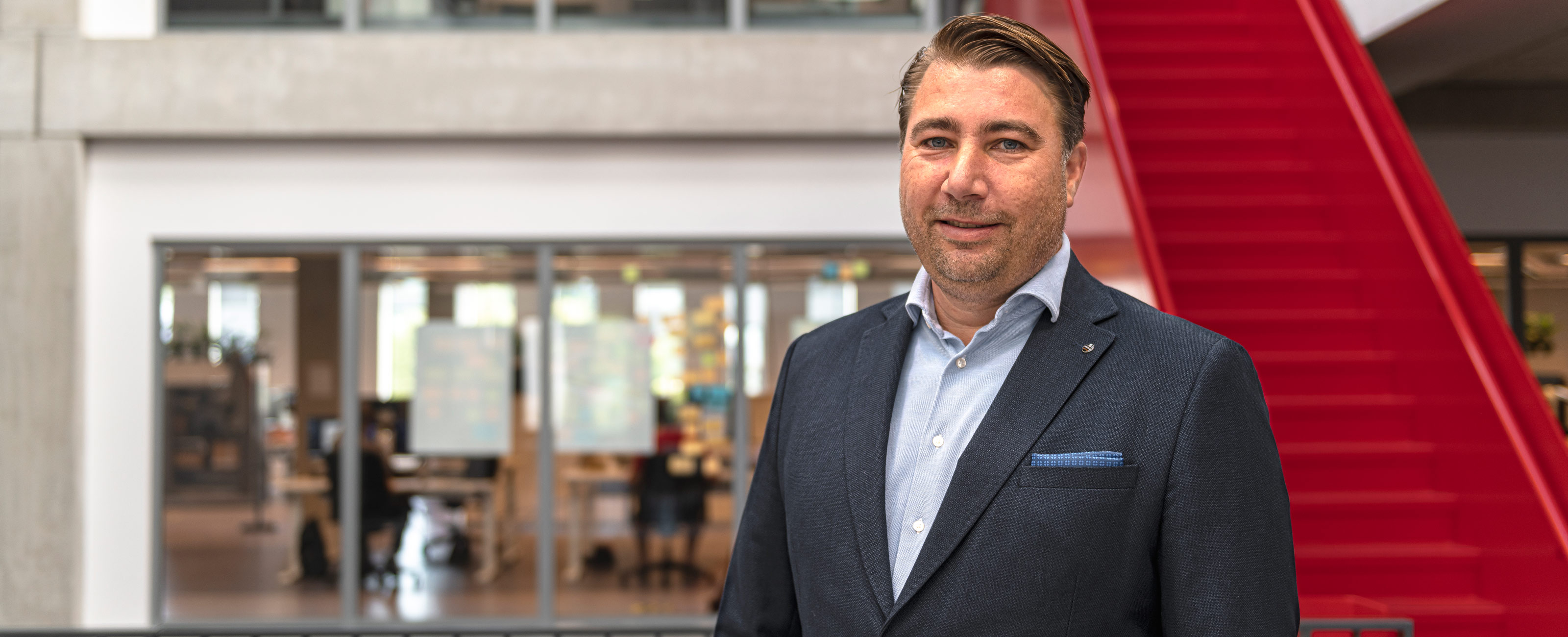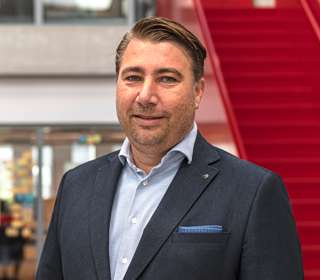Dennis Brouwer, ABB Electric Vehicle Infrastructure
A flexible custom-made building for innovation and collaboration
Adaptable yet customized: the new building for ABB Electric Vehicle Infrastructure unites these two apparent contradictions. Based in Delft, this branch of the technology company develops charging stations for electric vehicles of all sizes.
New ABB building in Delft follows growing organization
Dennis Brouwer, Product Group Manager in Delft, was closely involved in the design and construction process. ‘The developments in our branch are occurring much faster than we could have imagined. The new building is an attractive and functional basis in which we can grow. Our relations invite themselves to come and visit the building,’ says a smiling Dennis Brouwer. And not just to see the huge laboratory where the charging stations for buses, trucks and cars are tested. Although it’s hard to miss the laboratory, because it is designed like a street inside the building. Daylight enters everywhere – through the street, the facades and the skylights in the roof. ‘Young software engineers also enjoy working here. And that’s a big advantage, because with our company we want to grow as the market develops.’
The laboratory is designed like a street inside the building, daylight enters everywhere
From start-up to key world player
Brouwer started here when the Delft start-up Epyon was acquired by the Swiss-Swedish technology company ABB. The young company was based in Rijswijk, with a laboratory that had been inserted into an existing building. ‘That was not a lasting situation,’ recalls Brouwer. ‘Especially as more and more people started to work there. A search for existing buildings led to nothing, since our requirements are quite specific. When I started here, ABB Real Estate had already drawn up proposals for a new building. But in the end they were not pursued.’
Design & Build
EGM produced a first sketch in 2015 at the request of ABB Real Estate. There was a business case for the young Electric Vehicle Infrastructure division, which formed the basis for the building’s design. The proposals supported the business goals. Even so, it was not until 2017 that the construction proposals got the definitive go-ahead in a Design & Build contract with EGM and Hurks Bouw. Dennis Brouwer: ‘Our company prefers to invest in business than in bricks. But we continued to pitch the proposal – always in relation to the business case.’ In the end the decision was taken to realize the 2015 design. ‘Unfortunately, also with the budget and price level of 2015’, adds Brouwer with a smile. The cutbacks that followed made the proposal ‘clear and pure’. ‘And with the fit-out – the furniture – the building became softer and more human.’
3D visualizations for employees
An important aspect of the business plan was the growth of the organization: an unpredictable yet necessary estimate of that became part of the design. That was translated into a modular composition in which the organization can use spaces flexibly. Employees were closely involved in the various steps of the design and construction process. Brouwer: ‘Construction is an activity that has a huge impact on the people who are going to work in the building. For them the construction process took a long time – over two years. During construction we devised activities to keep up spirits for the growing numbers of employees at the existing building in Rijswijk who couldn’t wait to relocate to Delft.’ EGM and the contractor were involved in these activities. The architecture office organized a session with 3D glasses where everybody could walk through a virtual model of the future building, and Hurks organized a celebratory lunch of French fries to mark the topping out.
This building is a clear signal to our own people and the market: we are serious about the business of e-mobility. This building expresses that message at all levels
Showcase for technology
Not only were the architects given the ABB Guidelines for the design and interior, but the building also became a showcase for the company products. Brouwer: ‘The complete climate system and building management system are state of the art. Sensors for lighting and CO2 have been installed everywhere. Yes, this is a smart building!’ As with many aspects of the building, a basis has been laid for further development. ‘The hardware is in place, and now we can get to work on the software and data. That also applies to the laboratory. We cannot accurately predict what we will need in the future in terms of capacity and power. But what we do know precisely is that power has to be carried upwards from the bottom. The required cable has already been installed.’
Serious business
The new ABB building looks like a blank white box on the new business park located to the south of the campus of Delft University of Technology. ‘But when you come closer the building reveals more and more.’ Once inside, visitors see a huge image of a Formula E racing car that immediately puts them in the right mood. Brouwer, with a wink: ‘Not completely following the ABB guidelines’. The test set-ups are visible in the laboratory: car manufacturers bring their latest electric cars along to carry out tests. Every week Brouwer sees new employees going to their work stations via the bright-red staircase at the heart of the building. The open structure of the building and the transparent partition walls mean that the various parts of the company are clearly visible, and employees enjoy a good overview. ‘This building is a clear signal from ABB to its own people and the market: we are serious about the business of Electric Vehicle Infrastructure. This building expresses that message at all levels.’
Caroline Kruit, journalist and publisher, interviewed Dennis Brouwer in januari 2020

